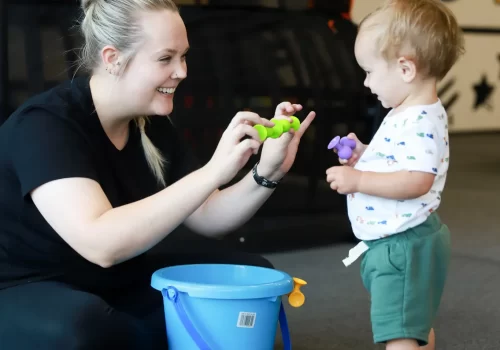The winter season has come to an end and springtime is underway. For many people, the expected warmer weather is a welcome change along with the regained opportunity to spend more time outdoors. However, for a child with sensory processing difficulties, this transitional period can be quite challenging and distressing. From fluctuations in weather to changes in clothing and routine, all can exacerbate sensory sensitivities. We’re here to help use the transition and offer our sensory tips for the Spring!
Inconsistent Weather: Spring is Unpredictable
Springtime signifies the beginning of warmer days and regrowth of nature. From the cleansing rain that washes away the dirty snow to the budding plants and flowers, what’s not to love? Well, for children with sensory processing challenges, the unpredictable weather patterns can be a struggle. Within the Midwest region, spring weather can range from sunny warm days to chilly winds and rain or even miscellaneous winter storm. This brings a lot of abrupt changes to a child’s day-to-day occupations including switching between seasonal clothing options, school and home play options, or even unexpected days off from school that transforms a child’s entire schedule for the day or week. To children with sensory processing challenges that thrive on a predictable schedule, this can be particularly difficult to understand and adjust to making for a distressful experience. In addition, the quick changes in weather can create severe weather that bring additional anxiety.
Spring Break and End of School Year Transitions
Spring season brings on exciting experiences after a long winter that limited our access to activities and things that we enjoy or depend on for comfort such as the benefits of what a little bit of sunshine can do for us. Spring break and the promise of summer break soon approaching are both generally perceived as fun and enjoyable, however that does not mean it is completely stress free. Vacations or school breaks interrupt our normal routines and for children with sensory processing challenges this can be very destabilizing and threatening. Routines provide predictability which can help children feel more secure, confident, and independent. On the contrary, breaks from routine bring on a sense of unpredictability that induces a sustained level of anxiety (Koderman, 2021). This in turn can produce a state of “fight or flight” and heightened attention and distress to sensory input that would otherwise be perceived as non-threating.
Prepare for Allergies
With changes in weather, allergies tend to flare up. Allergies bring on many changes to the body including itchy or stinging skin, itchy eyes, running nose, headaches, fatigue, spaciness, and moodiness. These changes drastically impact any person’s ability to go about their normal routines and responsibilities but throw in a child with sensory sensitivities and you’ve got a recipe for disaster. When allergies flair up a child’s typical coping strategies can be challenging to execute or they are not enough with the additional body ailments. Therefore, a child may struggle a bit more with regulating emotions or even revert back (temporarily) to previous undesirable behaviors to help manage the increased stressors.
What you need to know is we are here to help! Regardless of the sensory challenge this Spring may bring, we can help overcome the struggles so you can enjoy this exciting and beautiful season. To learn more about Move U or schedule an appointment, click here.
References:
Koderman,E.(2019).Expect the unexpected: Processing of sensory information in the anticipation of predictable and unpredictable threats. Research in Social Change,11(1) 80-115. https://doi.org/10.2478/rsc-2019-0005



